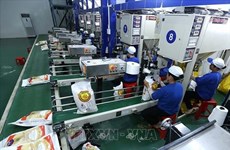German firms: Vietnam the right choice for expanding investment
Almost 93 percent of German companies already operating in Vietnam plan to continue investing in the country and more than 64% of them expect their business to develop better in the next 12 months, according to a survey revealed at the AHK World Business Outlook–Spring 2022.
 At the press conference (Photo: VietnamPlus)
At the press conference (Photo: VietnamPlus) The survey was conducted by the German Chambers of Commerce Abroad, Delegations and Representative Offices (AHKs).
Vietnam's great prospects of attracting foreign inflows
Dao Thu Trang, head of the market development strategy consulting department under the German Chamber of Commerce in Vietnam, said German businesses are more optimistic about economic development in Vietnam over the next 12 months than they were in the autumn of last year.
Vietnam’s border reopening and the Government’s drastic and timely policies have created a boost for post-pandemic economic recovery, Trang said.
More than 46% of them plan to recruit more employees in the coming year.
The surveyed businesses also demonstrate that the most important factors for their trade and investment decisions in Vietnam are political stability, the availability of skilled workers in technical and non-technical fields, and transport and logistics.
 Robin Hoenig speaks at the press conference (Photo: VietnamPlus)
Robin Hoenig speaks at the press conference (Photo: VietnamPlus)Addressing a press conference to announce the survey in Hanoi on June 8, Robin Hoenig, Senior Consultant for Trade Policies in Asia/ASEAN under the Singaporean-German Chamber of Industry and Commerce’s Trade Policy Competence Centre, said thanks to Vietnam’s participation in free trade agreements (FTAs), the country has favourable conditions to attract foreign direct investment (FDI) flows.
More than 73% of German businesses believe that the implementation of the EU-Vietnam FTA (EVFTA) from August 2020 increased their competitiveness in Vietnam.
Hoenig said European businesses regularly leverage the ASEAN-China FTA (ACFTA) and the Comprehensive and Progressive Agreement for Trans-Pacific Partnership (CPTPP).
Since implementing their business activities in Vietnam, German businesses evaluate that the most important factors are the availability of skilled labour in technical fields (58%), quality of education in technical fields (58%), and tariff trade barriers (57%).
Robin Hoenig, Senior Consultant for Trade Policies in Asia/ASEAN, speaking at the press conference (Photo: VietnamPlus)
Vietnam has favourable conditions to attract foreign investment flows thanks to its participation in the ACFTA and CPTPP Agreements.
When tariff barriers are eliminated, the Vietnamese market will have the advantage of supplying equipment for German businesses’ production activities, Hoenig said.
“China+1” strategy
Marko Walde, Chief Representative of the German Chamber of Commerce in Vietnam, said international investors are wishing to implement the “China +1” strategy.
Many German companies operating in only one location in Asia, mainly in China, are now looking to develop a second location outside the country, he said, adding that ASEAN is the preferred region.
In ASEAN, Vietnam is considered a suitable destination with its geographical position next to China, he noted.
German businesses consider Vietnam an attractive investment destination. With trade liberalisation, Vietnam’s services and products are more competitive in the region.
Over the past decade, bilateral trade between Vietnam and Germany has quadrupled, and Germany is now Vietnam's largest EU trading partner with their two-way trade hitting 14.4 billion EUR (14.9 billion USD) in 2021.
Thanks to the EVFTA, the German Chamber of Commerce in Vietnam expects the Germany-Vietnam trade to reach about 20 billion EUR in the next two or three years, Walde said.
However, he also pointed out challenges facing German businesses, especially those caused by global instability.
Although German enterprises have shown resilience in post-pandemic recovery, they are facing risks and challenges caused by global uncertainties that make them more concerned about their business development in the coming year, he said.
Currently, the greatest risk is the price of raw materials, followed by energy prices, and a shortage of skilled labour, Walde added.
The Russia-Ukraine conflict has also had an economic impact on German companies, he said, noting that higher costs for energy, raw materials and supply chain and logistics disruptions are their most worrying issue.
This results in changes to the international business investment activities of German firms, such as adjusted risk assessment on locations and economic decoupling of world regions, he stressed.
The AHK World Business Outlook (WBO) is based on a regular DIHK survey of member companies of the German Chambers of Commerce Abroad, Delegations and Representative Offices.
It collected feedback from more than 4,200 German companies, branches and subsidiaries worldwide, as well as companies with close ties to Germany, in March and April this year.
AHK WBO is seen as a barometer of the business confidence among German companies and as a key indicator of the German business situation and business expectations for Vietnamese economic development./.












